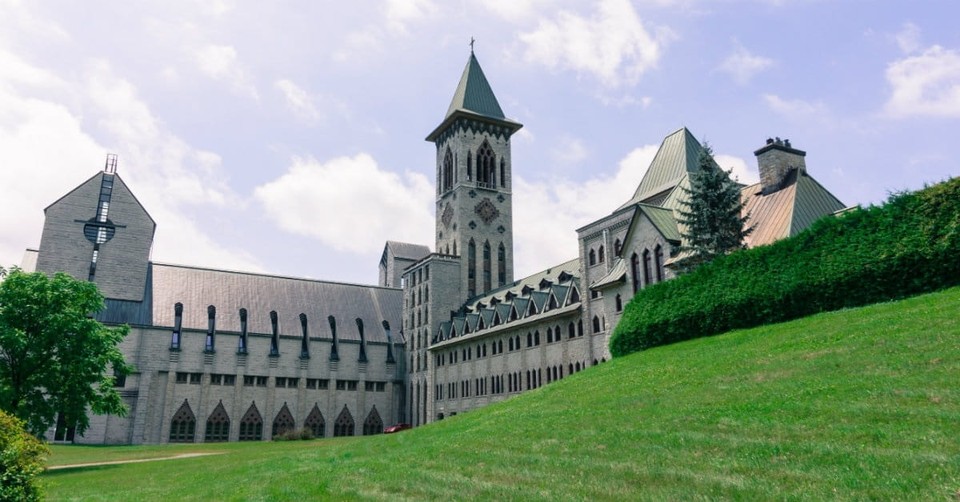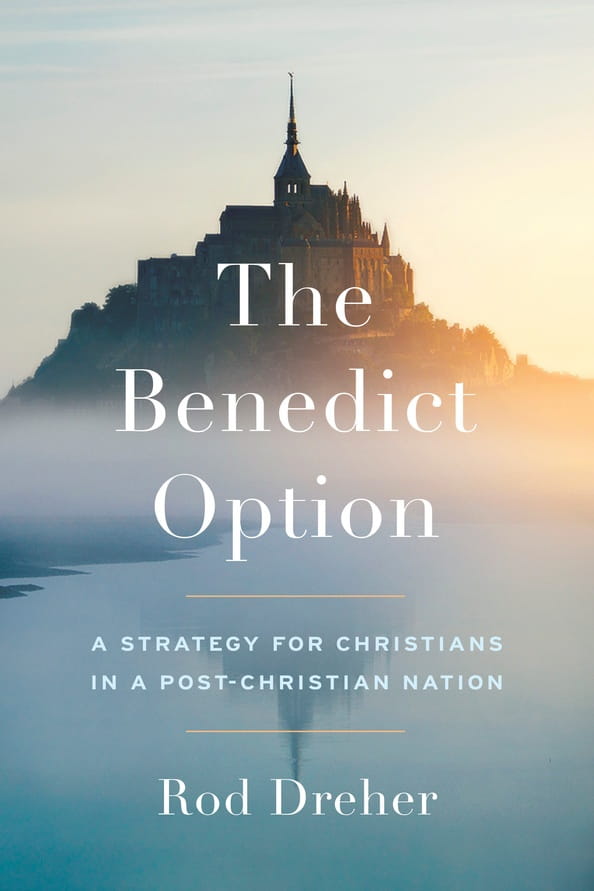The Benedict Option: What is It?

Rod Dreher’s book The Benedict Option has gained a foothold in the minds of many. David Brooks from the NYTimes calls The Benedict Option “the most discussed and most important religious book of the decade.” What makes The Benedict Option‘s influence striking is that it made such a big splash before the book was even released.
For many, however, the Benedict Option (BenOpt) is an unknown entity or fuzzy concept. In light of these factors, I will explain what the BenOpt is and will try to explain why the BenOpt has gained so much attention over the past few weeks.
What is the BenOpt?
The BenOpt is a call to live in an intentionally Christian way in light the West’s antagonism to Christianity. The name Benedict Option plays on the sixth century Benedict Rule, written by Benedict of Nursia during the turbulent decline of the Roman Empire. For Dreher, the West is going through a similar chaotic period. Karen Swallow Prior explains:
Understanding the title goes a long way toward understanding the concept. “Benedict” refers, of course, to the sixth century founder of a monastic order established during the swirling cultural chaos of the falling Roman Empire. Dreher turns to Benedict to pick up on a suggestion made by moral philosopher Alasdair MacIntyre in his 1981 book, After Virtue. MacIntyre points to Benedict as a model from the past for our current culture, which no longer sees virtue as essential to a flourishing civilization. “Option” is a twist on Rule, the name of the guidelines Benedict developed for godly and communal living in the monastery. Dreher’s use of “option” is an implicit acknowledgment that everything in modernity is a matter of choice, right down to the very attempt to resist modernity.
The BenOpt is not, however, a call to enter into a Monastic order. Prior further explains:
To the contrary, The Benedict Option calls Christians wherever they live and work to “form a vibrant counterculture” by cultivating practices and communities that reflect the understanding that Christians, who are not citizens of this world, need not “prop up the current order” (18). While the monastery that birthed the Benedict Rule was literal, the monastery invoked in The Benedict Option is metaphorical. It is not a place, but a way.
The way of life that BenOpt calls Christians to involves a number of virtues: order, prayer, work, asceticism, stability, community, hospitality, and balance (see here). I should note that by asceticism Dreher does not necessarily mean becoming a monk. He means disciplining oneself in a Christian way to resist culture. Although I cannot remember where, I’ve heard Carl Trueman describe the BenOpt as simply how the church is supposed to be. In this sense, the BenOpt is nothing new.
A note before moving on: if anyone objects to resourcing Benedict of Nursia for Evangelicals today due to Roman Catholic influence, I would respond by saying that Benedict is also part of the Reformed or Evangelical tradition. Benedict is our guy, the Roman Catholic Church went awry at the Reformation. So they may claim Benedict, but Benedict and anyone else before 1517 belong to us too. BenOpt has numerous problems but being Roman Catholic is not one of them.
Who is Rod Dreher?
Rod Dreher’s an Orthodox Christian and a public intellectual. As a Christian intellectual, he associates with the likes of Carl Trueman, Albert Mohler, and Russell Moore. As a public intellectual, he writes for The American Conservative. Dreher is an able writer and speaker. So he has been able to popularize his call for Christians to embrace the BenOpt in various venues.
As an Orthodox Christian, I find it fascinating that Dreher has made such an impact among Evangelicals. Even Don Carson on the Desiring God podcast recently discussed the BenOpt. Dreher’s influence may worry many Evangelicals who are not comfortable with Orthodox Christianity. I think especially of Baptist missionaries in Russia who experience a Christ-less religion among Orthodox believers and others in similar situations.
The worry is justified. But when it comes to Dreher, he really does seem to be encouraging Christians to return to their traditional beliefs and to form distinctive Christians communities, which as Trueman has said, is essentially a return to a Christian way of doing church. And insofar as Dreher points back to Benedict, we can find some common ground.
Why Is the Internet Alive with the Sound of Benedict?
Rod Dreher has been advocating the BenOpt for some time. Already on July 5, 2016, he joined Carl Trueman, Todd Pruitt, and Aimee Byrd on the Mortification of Spin to speak about the BenOpt. Dreher had been thinking about the BenOpt for some time. He seems to locate the origin of his thought to a time when he was reading Alasdair MacIntyre’s book After Virtue about ten years before the Mortification of Spin interview (so 2006).
The publication of his 2017 book (released on March 14), however, reinvigorated his argument and brought it into the mainstream. What Dreher has done so well is to identify a problem that many Christians see in our current cultural milieu. We have lost our moral majority and the culture is turning against Christian values, even demonizing them. Soon, as Dreher warns, Christians will no longer be able to participate in certain professions.
One only needs to consider how Christian bakers have been under fire in recent years. I can also see a possible future where Christians will have to choose between holding fast to their Christian convictions or pursuing a medical career, since Western medicine may soon demand that all medical professionals participate in physician assisted suicide.
Dreher’s thesis thus plays into a larger fear that Christians have lost their place in the culture. In part, this is why Dreher’s BenOpt appeals to a variety of Christians, especially to conservative Christians who will not give into cultural pressures and give up their convictions about, say, LGBTQ issues. This at least begins to explain why Dreher’s book has hit a nerve among Evangelicals.
Conclusion
The BenOpt is not a call to enter into a monastery but strategic retreat into Christian community. It’s a call to live in an intentional way to survive the oncoming cultural onslaught. Of course, the next decades will almost certainly not include physical persecution. But Christian schools will begin to lose their accreditation, jobs will filter out convictional Christians, and traditional beliefs will become more and more demonized. Dreher’s audience feels that this Dark Age is coming, and they are looking for strategies to survive the darkness. The BenOpt provides just that.
***
In my next post, I will chronicle how The Benedict Option grew to become what David Brooks described as”the most discussed and most important religious book of the decade.”
This article originally appeared on TheCripplegate.com. Used with permission.
Wyatt Graham is the Executive Director of The Gospel Coalition Canada. He also blogs at www.wyattgraham.com. Follow him at @wagraham. Follow TGCCanada at @CanadaTgc.
Image courtesy: Thinkstockphotos.com
Publication date: March 16, 2017
Originally published March 16, 2017.








